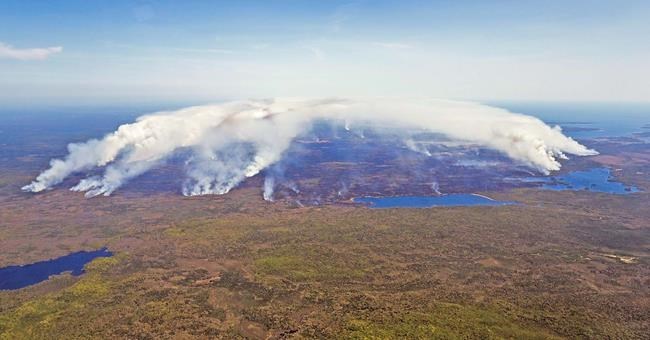HALIFAX — The largest wildfire ever recorded in Nova Scotia continued to grow Thursday as an adjacent fire in the province's southwest corner kept the coastal town of Shelburne on edge.
In all, there were four wildfires in the province burning out of control on Thursday, including the massive Barrington Lake fire in Shelburne County, which grew to more than 200 square kilometres despite a constant bombardment of water and fire retardant from a fleet of water bombers and air tankers.
But a much smaller fire that started Wednesday received immediate attention after it prompted evacuations south of Shelburne, which is home to 1,300 people. Within hours, the local Roseway Hospital was evacuated and residents started preparing to leave.
"It jumped up pretty quick with the high winds, low (humidity) and high temperatures," Dave Rockwood, a spokesman for the Department of Natural Resources, told a briefing Thursday. "We are hitting it very hard and fast."
The two fires have forced more than 5,000 people from their homes and cottages, 50 of which have been consumed by flames. Natural Resources Minister Tory Rushton said the Barrington Lake fire was under a “major aerial attack.”
"This is a very active fire and we cannot risk putting firefighters at the head of this," he told reporters. The minister said six more water bombers would be flying in from the United States on Friday and over the weekend, and an unspecified number of firefighters from the U.S. and Costa Rica were on their way.
Meanwhile, municipal officials in Halifax have begun breaking the news to residents whose homes were lost to a fast-moving wildfire after they were evacuated earlier this week from subdivisions northwest of the city.
"As you can imagine, that is a difficult process," Halifax Mayor Mike Savage said Thursday. "It's being handled with the utmost care and respect for those who have been devastated by this loss."
Savage went on to reveal that at least two people in the Halifax area were fined Wednesday night after one was caught lighting leaves on fire with a propane torch and another decided to have a bonfire — violations of a provincewide burn ban.
"This is a clear violation of the 'no-stupid' policy" the mayor said.
Deputy fire Chief David Meldrum said an audit of damaged and destroyed properties had been completed, but he could not provide the latest numbers.
Fire officials earlier said 200 structures, including 151 houses, have been claimed by the fire in suburban Halifax, which has been burning out of control since Sunday, as has the Barrington Lake fire. In all, 16,000 Halifax-area residents have been evacuated from their homes.
In southwestern Nova Scotia, the number of those displaced may not be as big, but the level of trepidation is just as high.
Amanda Sutherland, owner of The Cooper's Inn in downtown Shelburne, said some of her staff have had to leave the area, and she has a number of evacuees from the Barrington Lake fire staying at the inn.
"People are checking in on other family members, and every morning at breakfast, there's at least one person crying," she said in an interview Thursday, adding that her bags are already packed in case an evacuation is ordered.
"I have a couple who are with me right now who one day said they thought their house was gone, and the next day they're saying, 'We think it's OK.' That's just a roller-coaster of emotions ... It's heartbreaking."
Sutherland said the town's long, narrow harbour has been buzzing with water bombers scooping up water and heading back to the fires. She said she hasn't spent much time worrying about the destruction.
"You kind of go into crisis mode," she said in a calm, even voice. "We're making sure that everybody else is OK ... I'm focusing my energy on what I can do instead of the helplessness that you feel when you realize it's beyond your control."
Earlier in the day, fire officials announced that 50 per cent of the Halifax fire had been contained, and they confirmed it had not grown since Wednesday — but it remained out of control.
Still, the mayor said that could be counted as a win.
"We so far have no reported missing people or injuries," Savage said. "It is a miracle and a testament to the quick work of first responders."
Despite that good news, officials said firefighters were still dealing with parched conditions and rising temperatures. But by the early evening, it was clear not much had changed at the Halifax-area fire, mainly because the strong gusts that were expected never showed up.
"We're still feeling pretty good about this site," Meldrum told an afternoon briefing at a command post in Upper Tantallon, N.S. "But there's still a very big risk at this site."
Cooler temperatures and steady rain aren't expected until late Friday, though the forecast was calling for some spotty showers during the day.
In Ottawa, federal officials announced that more than 300 firefighters from the United States and South Africa are heading to Canada to battle an unprecedented wildfire season. As well, the Canadian Armed Forces has been tasked with providing help with logistics.
This report by The Canadian Press was first published June 1, 2023.
— With files from Keith Doucette
Michael MacDonald, The Canadian Press



